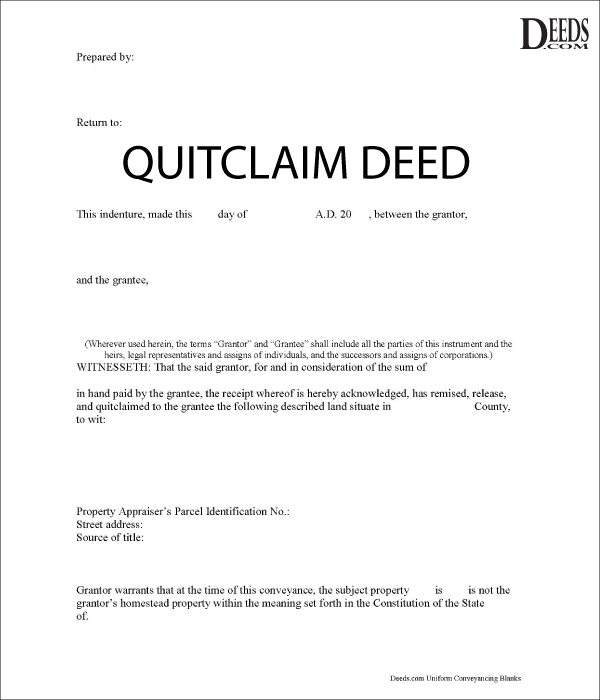
The quitclaim deed is the simplest. Just as the name suggests, with a quitclaim deed, one owner (or set of co-owners) quits their claim to the next title holder(s).
Quitclaim, defined: A legal instrument that transfers an interest in real estate from one person or entity (grantor) to another (grantee). As a non-warranty deed, the quitclaim (also commonly spelled "quit claim") conveys only the interest the grantor has. It does not guarantee the grantor legally owns the property.
Unlike in a standard, financed home purchase, there is no required title search for a quitclaim. This means no one is examining the chain of title to ensure the current owner (called the “grantor”) really has the right to convey the property. If liens or other claims exist on the property, the quitclaim doesn’t expose those possible claims. Nor does it require the grantor to resolve those issues. The recipient (the “grantee”) gets only the interest the grantor actually had — if any.
Note: The correct term in legal documents is always "Quitclaim Deed," not "quit claim deed."
Many people ask: When is a quitclaim the right deed to use for transferring a home? The usual quitclaim situations involve transfers between people who are related to each other. Parents, siblings, and other relatives might transfer homes this way. For a few other common examples:
Quitclaims are also used to clarify ownership. If questions come up about someone possibly having an interest in the title, that person could agree to sign a quitclaim to make sure the new owner holds the title, free and clear of the doubt. Title companies sometimes have people execute quitclaims to clear up questions before they will insure a title. Lenders may ask non-borrowing spouses to quitclaim their interest in a home that’s collateral for a loan.
There are also scenarios where getting a warranty deed is virtually impossible. A property with a title defect might have no way to move from one owner to the next without a quitclaim. Of course, that just pushes the reckoning further into the future, so approaching a court with a quiet title case could be the key to resolution. Consult a local real estate attorney for guidance if you are in this situation.
Quitclaiming to a family member to avoid probate is certainly possible, but it’s usually not the best way to handle estate planning. Sometimes the simplest way is not the best!
If you have decided a quitclaim is right for your particular situation, make some indispensable phone calls first. Check with your title insurance provider and your mortgage servicer before quitclaiming a home. Find out how it will impact your policy coverage or mortgage. You probably don’t want to lose your insurance coverage, or trigger an early loan payoff date.
As for the nuts and bolts, remember that each state has its own requirements for quitclaim deed text and format. Each state has specific signature, witness, and notarization rules. In addition, many local recording authorities add requirements for margins, paper size, property identification, and other details. For a valid transfer, be sure to follow the rules.
Quitclaims, like all property transfers, affect your rights. Consult with an experienced lawyer in your state to protect your interests.
Homeowners have the right to transfer their ownership. A homeowner can create a valid quitclaim deed from scratch. But these days, it’s easy to find a quitclaim deed form for your state online and download it. Alternatively, you can visit the recording office in the home’s county, and request a form.
A quitclaim deed requires the signature of every owner before the property changes hands. In community property states, like Texas and California, both spouses must sign deeds involving real estate transfers. The grantor or grantors sign the property over, and the grantee(s) might also need to sign, depending on state laws. Some states require witnesses. Typically, the grantor's signature must be notarized. Note: The notarization affirms that the identity of the person signing the document has been verified — not that the quitclaim deed is valid.
Once the completed document has been signed, delivered, and accepted by the grantee, it is considered legally executed. (The grantee has the prerogative to refuse the deed.)
The grantee takes the final step, by recording the executed deed with the county clerk or county recorder of deeds. To convey the title so that it’s in the public record and binding for third parties, a quitclaim deed must be signed, notarized, and recorded in the property’s county. Filers should expect to pay recording fees.

A quitclaim must, of course, be in writing. It must include a legal description of the property, the address and county, the transfer date, and the names of the parties. While each county has specific formatting requirements, key elements are common to all quitclaim deeds:
As you see, the quitclaim deed carries no warranty. So, except in the case of quitclaim fraud, the grantee cannot sue if the grantor did not own the interest that the quitclaim purported to transfer. Even if you can sue because of the presence of fraud, it is extremely difficult to recover a title that was wrongly transferred.
Because a recipient enjoys greater protection with a warranty deed than with a quitclaim, a quitclaim deed is usually used among parties who know each other, and have some familiarity with the property’s history.
If you are considering buying real estate, especially from someone you do not know, and they offer to transfer the property to you using a quitclaim, seek the advice of an attorney or title professional.
If you own real estate and are asked to sign a quitclaim to a business that says it can save your home or help you refinance, know that you are giving your real estate to someone else. You will not be likely to get it back.
A warranty deed says its grantor owns the property free and clear, and has the right to transfer it to another party. But quitclaims are non-warranty deeds. Quitclaims can have unknown title defects.
The recipient of a quitclaim can uncover title defects by having a title search done. The search can uncover a range of claims against the property, such as:
Yes, and checking the county records is a good practice for homeowners and anyone who might be asked to accept a deed. The local recorder’s office is conveniently located in the home’s county. Plus, many title records now appear online.
For a more thorough process, have a title insurance company or abstractor perform a title search. Because these professionals have access to multiple data sources, their searches may find issues that the lay person can easily miss.

The question of the day is: I need to take someone off my house deed. Can I do it without calling anyone’s attention to this? Spoiler alert: No. Nor.
Published on: July 22, 2024

Maybe you’re buying a new home. A home for you and your significant other to live in. Or maybe you already hold a deed, and are thinking of quitclaiming.
Published on: June 21, 2024

If you’re newly separated or divorced, you could be shopping for a home. Letting go of the home you shared with your former partner leads to a series.
Published on: June 19, 2024

A quitclaim deed easily, quickly transfers your home’s title. You can use a quitclaim to give a home to someone else, with no expectation of a payment.
Published on: January 17, 2024

Some people will steal their own mothers’ homes. In a stunning case of deed fraud, a woman named Wanda donned a wig and pretended to be her own elderly.
Published on: July 12, 2023

A quitclaim deed is a simple form that transfers a piece of real estate from one person to another. Any homeowner can fill out a quitclaim deed with their.
Published on: November 7, 2022

A quitclaim deed transfers real estate to a new owner. A properly completed and recorded quitclaim cannot be undone. Here’s why — and what to do next.
Published on: September 5, 2022

Parting of the Ways Co-ownership of a house can unwind in several ways. One way is through divorce proceedings. You might be wondering how this works.
Published on: May 13, 2022
Note: Deeds.com does not provide legal advice. This information is general and may vary by state. Consult a real estate lawyer for legal advice specific to your situation.